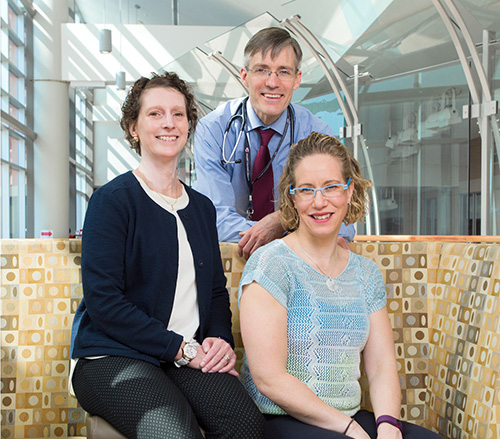
Research coordinator Kathryn Rankin, pediatric cardiologist Andrew Mackie and nurse practitioner Jody Gingrich in the Mazankowski Alberta Heart Institute.
Adolescence is a time of transition to adulthood. For kids with a chronic health condition, this includes moving from a child and family-focused health care system to being more independent in an individual focused adult system.
Pediatric cardiologist Andrew Mackie was surprised by the number of adolescents and young adults with congenital heart disease (CHD) "lost to follow up", not attending a cardiology clinic for five or even 10 years, after spending much of their childhood engaged with specialized health care teams in the pediatric world. Even more disturbing was his experience with older teens that ended up in emergency rooms with very serious complications that may have been avoided if they had proper follow up care.
"We work so hard as cardiologists, cardiac surgeons, nurses and other allied health providers looking after these kids in early childhood," explains Mackie. "So to then lose contact with them at 18-19 years of age is unfortunate. After all we've invested in them, we can't simply drop the ball 18 years later."
Inspired to make a difference, Mackie embarked on a path to improve the way the CHD clinic teams prepare teens to successfully transition to adult care. The key for success in the adult world, it seemed, was for teens to have enough knowledge about their health condition and the skills to self-manage, including being able to communicate confidently with physicians and nurses.
Mackie knew that any change they implemented in the clinic needed to be evidence-based. "There were no peer-reviewed publications in the literature in 2008, when I first began to look, on transition to adult care for those with CHD," says Mackie. "There were programs, and publications that described what the programs do, but there was no data, no results to demonstrate efficacy." Advances in care since the 1980s have meant increasing numbers of survivors of childhood disease are now reaching adulthood and, in the last five years, the body of research is expanding exponentially to address the new challenges this presents.
Mackie and his team have added to research in adolescent transition. His sequential series of research studies that began in 2009 are entitled CHAPTER (Congenital Heart Adolescents Participating in Transition Evaluation Research) along with a "prologue" study that began by focusing on the risk factors of youth in Quebec lost to clinical follow up. CHAPTER studies I, II, III and IV are in various stages of publication, enrolment and funding requests with each building on the results of the previous study.
The results provided the evidence needed for Mackie to develop a formal transition program and hire a nurse educator for the CHD clinic at the Stollery Children's Hospital. Jody Gingrich now meets one-on-one with 16-17 year olds to provide the information and tools these teens need to begin to manage their own health. The one-hour, one-on-one session covers the new expectations for managing their health care as an adult, as well as information about their condition, interventions the teen received as a child, their specific heart anatomy, what their "normal" test results should be, and late complications they should watch for as they get older. Next up is a "sex, drugs and rock & roll" conversation that covers risk factors specific to those with CHD.
Mackie has learned a lot through his research and transition program implementation in the CHD clinic. It turns out that most of his findings are directly translatable to other conditions. He was surprised when asked to give a lecture on adolescent transition to pediatric oncologists at Memorial Sloan Kettering Cancer Institute in New York. When he reviewed the literature for oncology, he found amazing similarities. "You could literally take the same papers and just change the name of the chronic condition," he says. "It was a learning experience for me."